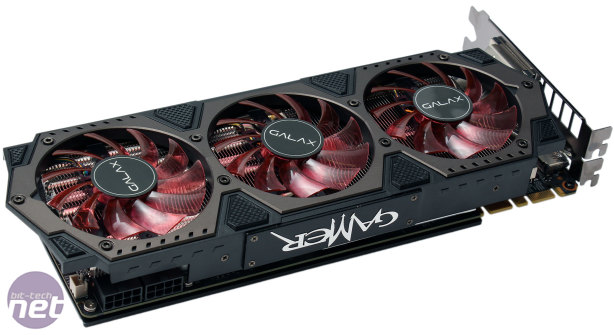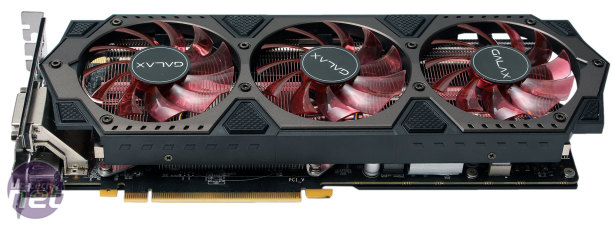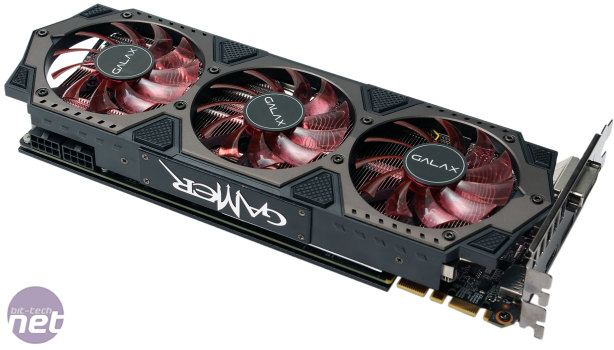
Performance Analysis
By and large, performance of the Galax GeForce GTX 980 SOC is on par with the Gigabyte GeForce GTX 980 G1 Gaming; unsurprising given that their clock speeds are identical.With a minimum of 45fps in Battlefield 4 at 1440p, this card will prove smooth enough for play at full settings, though anyone targeting 60fps will want to turn anti-aliasing off or opt for a dual-GPU set-up. The results of 30fps at 4K (with no anti-aliasing) translates to technically playable, and the Galax card is the joint fastest single GPU card we've seen in this test, but even so for a fast-paced shooter such as this it may still prove a little too sluggish with settings this demanding.
BioShock Infinite is handled with ease at 1440p, with the Galax GTX 980 SOC again achieving the joint fastest result for a single GPU card. At 4K, the Galax GTX 980 SOC is 3fps faster than the Gigabyte GTX 980 G1 Gaming; Nvidia may have made some optimisations in its latest batch of drivers.
Crysis 3 is a very demanding game; even at 1440p this ultra high-end card manages a minimum of 42fps, and that's without anti-aliasing. At 4K, the minimum oddly dips to 2fps lower than the Gigabyte, despite shared clock speeds, though on average the cards are equally fast. Not that it matters, however, as neither card attains remotely playable frame rates anyway; only the R9 295X2 has managed this so far.
Finally, there's Skyrim, which is of course no problem for the GTX 980 SOC to run. We also see it hit a small but noteworthy milestone at 4K here, with it being the first single GPU card to never dip below 60fps with everything at maximum settings.
In Unigine Valley, the GTX 980 SOC is almost the fastest single GPU card. It's technically beaten by the Gigabyte GTX 980 G1 Gaming at both 1080p and 1440p, but only by a meaningless 33 and 23 points respectively; less than 1 percent in both cases. More importantly, it's 34 percent and 41 percent quicker than a stock R9 290X.
Power consumption is within 2W of the Gigabyte card and again we shouldn't be surprised; both use dual 8-pin plugs and have the same clock speeds and number of fans. However, when it comes to heat, the Gigabyte card has the upper hand, with a 15°C lower delta T. That said, the Galax card is still cooler than numerous less powerful cards, and is 5°C cooler than a reference GTX 980 too, which runs slower. Nevertheless, the Galax card was only a touch quieter than Gigabyte's to our ears, despite the sizeable temperature difference. Either way, Asus's Strix GTX 980 provides the best balance of cooling to noise; it's got a semi-passive mode for one thing, and is almost inaudible even under load.
Despite no special power circuitry components, the Galax GTX 980 SOC is just as potent an overclocker as other models we've seen, achieving the same base clock speed as the Asus Strix GTX 980 and 10MHz less than the Gigabyte G1 Gaming model, though these two cards both boosted to slightly faster speeds, likely due to them running cooler. All three cards were stable up to a 7.7GHz memory clock as well. Power, heat and noise do increase at the faster settings, but not in any way that's excessive or unexpected. Differences in performance between the three partner GTX 980 cards we've seen when overclocked is essentially meaningless. It should also be noted that even a stock GTX 980 is a very strong overclocker and keeps pace in most tests as well.
Conclusion
At £420, Galax is being very aggressive on pricing with the GTX 980 SOC; it's at least £50 less expensive than the G1 Gaming model from Gigabyte which runs at the same frequencies. Granted, the Gigabyte card runs significantly cooler, but it's also a touch louder. It also has upgraded power circuitry components whereas the Galax does not, but we didn't hear coil whine from the Galax card and it overclocks just as well, so in practical terms there's little difference. Build quality on both cards is also very good, and they are similarly sized and have the same three year warranty. Looking at the rest of the market, the Galax GTX 980 SOC is one of the fastest yet one of the most affordable SKUs available; cheaper even than some reference cards. There's no denying it's good value as far as GTX 980s go, but of course its Nvidia's GTX 970 that is its real price-performance offering.While the high clock speeds coupled with low pricing will appeal to many, the Galax card isn't without its flaws. We're bored of saying it but we would like to see more partner cards offering overclocked memory. It's also not as quiet as we'd hoped, especially given the relatively high GPU temperature we observed under load, and it has no semi-passive mode either. However, we'd still hesitate to call the Galax GTX 980 SOC loud. As such, while we think the Asus Strix 980 is the best balanced partner card we've seen so far all things considered, it's £60 more expensive, so the Galax GTX 980 SOC comes recommended if your top priority is maximum single GPU performance.

-
Performance39 / 40
-
Features26 / 30
-
Value20 / 30


MSI MPG Velox 100R Chassis Review
October 14 2021 | 15:04











Want to comment? Please log in.